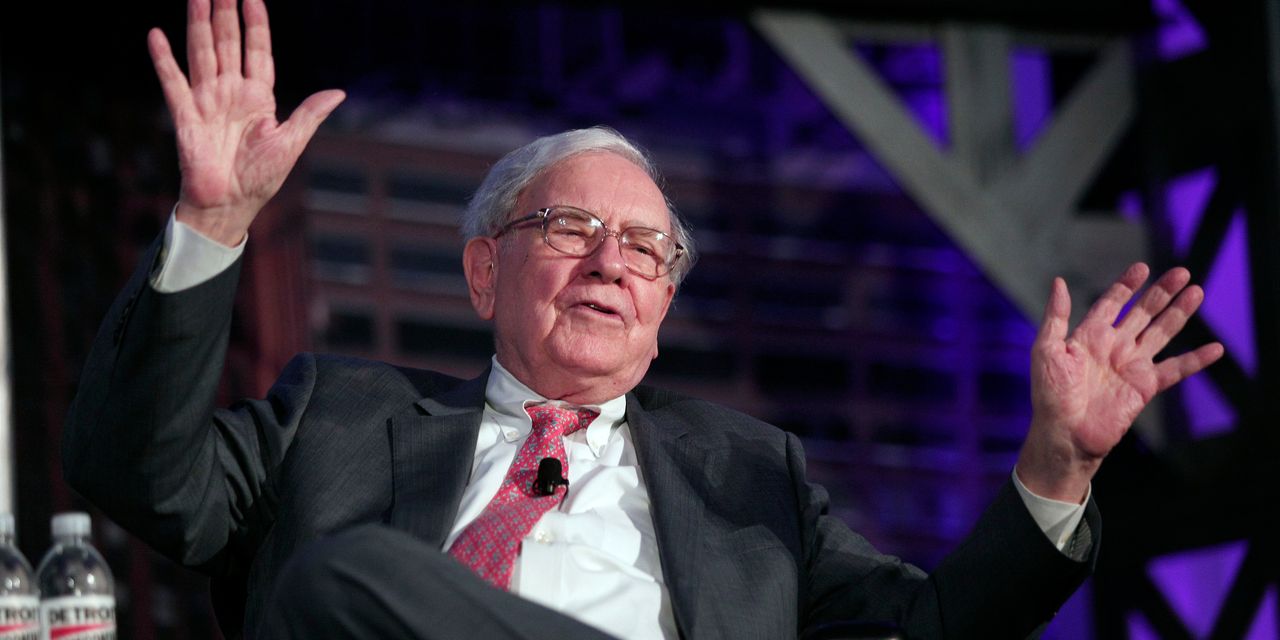There was a lot to like in Berkshire Hathaway’s second-quarter report Saturday and one negative.
Berkshire Hathaway (ticker: BRK.A, BRK.B) had record operating earnings (excluding gains in the company’s equity portfolio) of $10 billion, up 6% from a year ago. Book value grew 7% to about $373,000 per class A share from the first quarter, Barron’s estimates.
The operating results were even better when excluding one-time currency gains in both the second quarter of 2022 and 2023, as profits rose 14% to $9.6 billion, Barron’s estimates.
Berkshire’s reported operating profits per share of about $6,930 per class A share handily topped the FactSet consensus by more than 20%. CEO Warren Buffett tells investors to focus on the operating profits rather than the headline number which includes one-time investment gains. That figure was $35.9 billion in the second quarter due to the stock market’s strength.
Investors like what they’ve seen. Class A and B shares are up over 2% in Monday trading, and have topped recent record intraday highs. Berkshire’s class A stock is up 2.3% to $545,893, a new record, while the class B shares are 2.6% higher at $358.91.
James Shanahan, an analyst at Edward Jones, told Barron’s that it was a strong quarter for Berkshire Hathaway and he recommends the stock, citing a “diverse group of operating companies and investments.” He’s encouraged by better insurance underwriting results.
Berkshire Hathaway’s $353 billion equity portfolio appreciated smartly due largely to strength in the company’s largest holding,
Apple
(AAPL). And Berkshire Hathaway ended the quarter with a truly fortress balance sheet, including shareholder equity of $540 billion, the most of any American company, and cash of $147 billion. Cash, mostly held in U.S. Treasury bills, accounts for about 20% of Berkshire Hathaway’s market capitalization of around $768 billion.
This gives Berkshire Hathaway CEO Warren Buffett ample wherewithal to pay for what has been an elusive “elephant” sized acquisition that he has long sought without using any Berkshire Hathaway stock—something Buffett is loath to issue. The cash also offers sleep-at-night comfort to Berkshire Hathaway holders.
The one negative was that Berkshire Hathaway’s stock repurchases slowed in the second quarter to $1.4 billion, down from $4.4 billion in the first quarter, and one of the lower quarterly totals in recent years.
Unlike many companies that buy stock regardless of price, Buffett is price-sensitive, and regularly tells that to Berkshire Hathaway holders. The pace of Berkshire Hathaway’s buybacks is an indication of how he views the stock.
The slower pace of buybacks probably reflects the strength in Berkshire Hathaway’s shares. The good news for Berkshire Hathaway investors is that the company’s book value and intrinsic value should head higher over time, making the valuation more appealing to Buffett.
Berkshire Hathaway stock now trades for nearly 1.5 times book value, which is a little higher than the recent average. The class A shares are up 17% so far this year in line with the rise in the S&P 500.
The buyback pace slowed even further in July with Berkshire Hathaway repurchasing about $90 million of stock through July 26, the date of its 10-Q report which also was released Saturday, Barron’s estimates.
Buffett isn’t buying much equity this year. The company has been a net seller of $18 billion of stocks this year including
Chevron
(CVX), which was reduced to about 123 million shares on June 30 from 132 million on March 31, and about 167 million at year-end 2022. This recent net selling of stocks compares with net buying of $45 billion in the first half of 2022.
The growth in operating profits (which excludes the big gain in Berkshire Hathaway’s equity portfolio that flows through its income statement) was impressive because it came despite a 24% drop in profits of the Burlington Northern railroad, one of Berkshire Hathaway’s largest businesses.
Insurance underwriting profits were strong and Berkshire Hathaway is reaping the benefits of the rise in short rates to 5% as its interest and other investment income (excluding dividends) rose to $1.4 billion in the second quarter from about $200 million in the year-earlier period.
That income is running at a pace of more than $5 billion annually, and Buffett loves buying T-bills at current rates of more than 5%—Berkshire Hathaway purchases about $10 billion a week. Geico, Berkshire’s auto insurer, swung to an underwriting profit of about $500 million in the quarter from a similarly sized loss in the year-earlier period. That was encouraging after its weak results in 2022.
The $10 billion operating profits in the period were boosted by nearly $500 million in currency gains in the quarter related to borrowing Japanese yen, which are one-time in nature. Berkshire Hathaway’s earnings also are benefiting from how it accounts for its holding in
Occidental Petroleum
(OXY) now that the stake is above 20%. There were over $1 billion in currency gains in the year-earlier period. Some of Berkshire Hathaway’s housing-related businesses had weaker results in the quarter.
But the overall results are impressive and highlight the profit gains in recent years and the breadth of the company’s earnings power. Berkshire Hathaway, for instance, earned about $6 billion in the second quarter of 2019, meaning profits are up over 50% since then. Not bad for an enormous company.
The record earnings and a cash-rich balance sheet show why Berkshire Hathaway is a must-own stock for so many individual investors.
Write to Andrew Bary at [email protected]
Read the full article here



